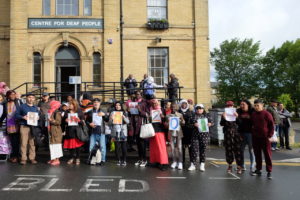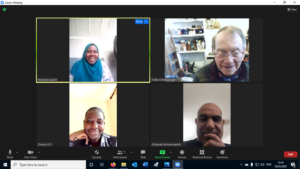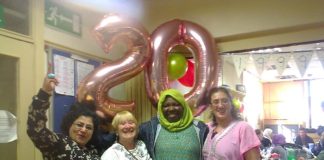Bradford Immigration and Asylum Seekers Support and Advice Network (BIASAN) has been awarded the Queen’s Award for Voluntary Service.
The organisation which has helped support asylum seekers and refugees in Bradford for over twenty years has received the highest honour a charity in Britain can receive.

Nominated by ex-community police liaison officer Maria Dobrwynchok who often frequented BIASAN activities to help advise the team and service users on law and local information, the charity had to go through rounds of interviews with local assessment panels of which they get recommended to the department for Digital, Culture, Media, and Sports (DCMS) which sends a final list to the Queen for her approval.
Richard Hargreaves, a volunteer at BIASAN who provides English lessons for asylum seekers and refugees in Bradford, said: “We were nominated for the Queen’s Award for Voluntary Service by West Yorkshire Police’s community liaison officer at the time, Maria Dobrwynchok. You can’t nominate yourself, you have to be nominated by other people. We then had to provide evidence of our work and went through a few rounds of interviews, only to be then chosen as one of 241 charities handpicked by the Queen to win an award.
“We were thrilled to be nominated but it is funny that out of all the charities chosen, we were one of only two charities that work with asylum seekers and refugees. The home office is increasingly creating a hostile and uncomfortable environment for asylum seekers and refugees and so for our work to be approved and recognised by the government and the Queen is interesting.”
The charity, which is fully volunteer-run, has no paid staff or officers. Instead, it relies on volunteers, of which many used to be asylum seekers or refugees themselves, to provide its free services.
Some use “asylum seekers” and “refugees” interchangeably, but as Mr Hargreaves points out, they are very different with varying levels of restrictions in Britain. Mr Hargreaves clarifies the difference by saying: “Refugees are people fleeing armed conflicts or persecution in their home country with asylum seekers being people who arrive in Britain informally.”
This is backed up by UK government policy which states someone being a refugee if he or she has fled their own country because of a “well-founded fear of being persecuted for reasons of race, religion, nationality, membership of a particular social group or political opinion”.
An asylum seeker is “someone who has applied to the Home Office for refugee status or one of those other forms of international protection, and is awaiting a decision on that application.” The employment of asylum seekers is strictly prohibited and if the home office accepts their application then they get a “leave to remain” settlement status, where they get a specific period of time in the country but with limited activities and restrictions on their visa.
“The home office is increasingly creating a hostile and uncomfortable environment for asylum seekers and refugees and so for our work to be approved and recognised by the government and the Queen is interesting.”
Pre-pandemic, BIASAN ran many activities including a weekly mother-and-child group, English classes, drop-in sessions at the Bradford Deaf Centre, which provided legal advice as well as a free homecooked meal every Thursday for up to 100 people, as well as one-off activities that include trips to the seaside or overnight residentials to the Yorkshire Dales. The charity also operates a shop where people can donate clothes and household goods that are then made available to people in need.
Since March 2020, the drop-in sessions have had to stop temporarily and the mother-and-child group linked up with other organisations to continue to provide the support, but the English classes moved online, with more people than before taking up the service.

The charity now teaches between 30 and 45 people a week conversational English and through funding provides £10 a month phone credit for up to 30 students to be able to access the internet for the classes. The lessons which are now held over the video conferencing app Zoom are taught two to three times a week depending on volunteer availability.
The charity also helps provide toiletries, essentials, and appropriate clothes to those who wouldn’t be otherwise able to access them due to lack of money because of immigration status.
Mr Hargreaves said: “Due to pandemic, a lot of single men refugees and asylum seekers have been put up in hotel rooms across Bradford. This has then given the government an excuse not to pay out benefits because their lodge and food was paid for through the hotels. This meant that the men did not have any money to buy toiletries and other essentials like toothbrushes and toothpaste, or any suitable clothes.
“Some men only had the clothes on their back and flip-flops, which were inappropriate for winter, which is why we had to give these items out. The food provided in the hotels were minimal and up to the hotel’s discretion which meant that they weren’t getting any fresh fruit or vegetables so we aimed to provide that as much as possible too.”
Mr Hargreaves went on to say: “I just want to give a huge thank you to our volunteers, Christine at the Bradford Daty Centre, and all the people in Bradford who help our charities and the refugees and asylum seekers in our city.”




